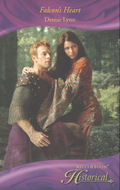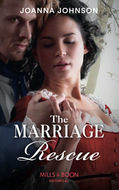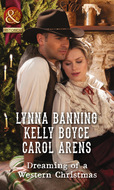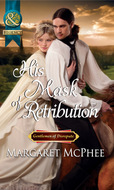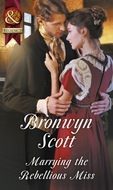Kitap dosya olarak indirilemez ancak uygulamamız üzerinden veya online olarak web sitemizden okunabilir.
Kitabı oku: «Working Man, Society Bride»
“Can I tempt you to a boat trip, my lady?”
Lucy became aware of a man in a rowing boat pulling toward her, but she was so mesmerized that she felt no fear. A few more deft strokes with the oars and he had drawn up by the bank beside her. She knew who he was, of course, had known almost from the beginning, and the strange thing was that she wasn’t at all surprised.
“How did you know I would be here?”
“I didn’t. I simply hoped you would be.”
His hand was outstretched. She could reach out and take it and seal her own fate, or she could turn and run and her fate would still be sealed—in another way. The choice was hers. She took the hand.
Working Man, Society Bride
Harlequin®Historical
MILLS & BOON
Before you start reading, why not sign up?
Thank you for downloading this Mills & Boon book. If you want to hear about exclusive discounts, special offers and competitions, sign up to our email newsletter today!
Or simply visit
Mills & Boon emails are completely free to receive and you can unsubscribe at any time via the link in any email we send you.
MARY NICHOLS
Born in Singapore, Mary Nichols came to England when she was three, and has spent most of her life in different parts of East Anglia. She has been a radiographer, school secretary, information officer and industrial editor, as well as a writer. She has three grown children and four grandchildren.
Mary Nichols
Working Man, Society Bride

TORONTO • NEW YORK • LONDON
AMSTERDAM • PARIS • SYDNEY • HAMBURG
STOCKHOLM • ATHENS • TOKYO • MILAN • MADRID
PRAGUE • WARSAW • BUDAPEST • AUCKLAND
Available from Harlequin®Historical and MARY NICHOLS
The Incomparable Countess #156
Lady Lavinia’s Match #163
A Lady of Consequence #169
Mistress of Madderlea #177
The Hemingford Scandal #196
Marrying Miss Hemingford #199
Bachelor Duke #204
Dear Deceiver #213
An Unusual Bequest #218
The Reluctant Escort #226
Talk of the Ton #236
Working Man, Society Bride #244
DON’T MISS THESE OTHER
NOVELS AVAILABLE NOW:
#911 THE SHOCKING LORD STANDON—Louise Allen
Encountering a respectable governess in scandalizing circumstances, Gareth Morant, Earl of Standon, demands her help. He educates the buttoned-up Miss Jessica Gifford in the courtesan’s arts. But he hasn’t bargained on such an ardent, clever pupil—or on his passionate response to her!
The next sensual installment of Louise Allen’s
Those Scandalous Ravenhurstsminiseries!
#912 UNLACING LILLY—Gail Ranstrom
Abducting Lillian O’Rourke from the altar is part of his plan of revenge. But Devlin Farrell had no idea that he would fall for his innocent captive. Devlin may be baseborn, but to Lilly he’s the truest and bravest gentleman….
A dramatic tale of love, danger and sacrifice.
#913 THE REBEL AND THE LADY—Kathryn Albright
Returning to an unstable Texas, Jack Dumont is determined not to engage in the disputes brewing, wanting only to reunite with his brother. But beholding the entrancing beauty that is Victoria Ruiz, Jack realizes that to gain her love, he must fight hard for her land—and for her….
Rebellion, freedom and romance—all in one passionate Texan tale!
#914 TEMPLAR KNIGHT, FORBIDDEN BRIDE—Lynna Banning
Beautiful, talented Leonor de Balenguer y Hassam is more interested in music than marriage, while Templar Knight Reynaud is seeking his true identity.
As they travel together, both keeping secrets, attraction flares, but Reynaud knows he can’t offer Leonor what she deserves….
Travel on a thrilling journey through Medieval France and Spain!
#243 A WORTHY GENTLEMAN—Anne Herries
Miss Sarah Hunter was delighted at the prospect of a Season in London—and at the opportunity to spend time with the man who’d once saved her life! But Mr. Elworthy was much changed….
The final exciting novel in Anne Herries’sThe Hellfire Mysteries
Contents
Chapter One
Chapter Two
Chapter Three
Chapter Four
Chapter Five
Chapter Six
Chapter Seven
Chapter Eight
Chapter Nine
Chapter Ten
Chapter Eleven
Chapter One
July 1844
After waiting outside the station for twenty minutes while a train from another line passed through, the train from London drew into Leicester and hissed to a halt. The Countess of Luffenham and her daughter, Lady Lucinda Vernley, waited until a porter came along to open the door before stepping down on to the platform.
Lucy was glad to leave the sticky heat of the carriage and breathe fresh air again. She would have liked to open the window as soon as they left London, but her mother forbade it on the grounds that they would be choked on the smoke and covered in black smuts, which they would never be able to clean off their clothes. And as their clothes had cost the Earl a pretty penny, they would have to put up with the heat. And so, for six interminable hours, they had sat and cooked.
Mama did not like travelling by train and would have much preferred to go by coach, but that would have taken even longer and necessitated changing the horses every dozen or so miles and staying at least one night somewhere on the road. The Earl, for all his apparent wealth, was a careful man and begrudged the cost when they could travel first class by rail and reach London inside a day. When his wife had mildly pointed out that they still had to be taken to the railhead by carriage and fetched again on their return, he had given her a lecture on the economics of using his own horses for a short ride and railways for a longer trip, and she had fallen silent. Arguing with the Earl was something she was not prepared to do.
‘Good afternoon, my lady,’ the porter said, touching his cap and taking her small valise from her to carry it out to the waiting carriage. ‘Shall the wagon be coming for your luggage?’
‘Yes. You will find everything labelled. See that it is all loaded properly. The last time we travelled a hatbox was lost and it took days for it to be found and returned to me.’
‘I was very sorry about that, my lady. I’ll make sure it doesn’t happen again.’
They swept past the luggage van where two porters were busy disgorging boxes, trunks, portmanteaux and hatboxes on to the platform. They looked up from their task to watch the ladies go. The Countess, who did not deign to notice them, walked past, looking straight ahead, her back ramrod straight. She was dressed in a gown of some silky, striped material in three shades of brown: chocolate, amber and coffee. Her hat, trimmed with feathers, flowers and loops of ribbon, echoed these colours. Her daughter was in deep pink, the bodice of her gown closely fitting, its voluminous skirt arranged in tiers each trimmed with matching lace. She wore a short cape and a tiny bonnet set on the back of her pretty head. They were followed by a maid in dove grey. When all three disappeared from sight, the men shrugged their shoulders and returned to their task.
The carriage was waiting with the hood down and they were soon on their way through the familiar countryside of Leicestershire. This was rolling terrain, with hills and dales, some quite steep, good hunting-and-shooting country. Cattle and sheep grazed in the meadows and cut hay lay on the fields to dry. Field workers, who were turning the hay with rakes, looked up as they passed; some who recognised the carriage touched their caps or gave a little bob of a curtsy. The Countess graciously acknowledged this with a tiny inclination of her head.
At the halfway point the carriage drew into the yard of a posting inn where Mr Downham, the Earl’s steward, had arranged for fresh horses to be brought to complete the journey. The ones that had met them at the station would be taken on to Luffenham the next morning after they had been rested. While the change was being made, the Countess and her daughter went inside the inn for refreshment. It was a time-honoured practice that was rapidly dying out as the new railways spread their tentacles across the countryside. But there was still no line near enough to Luffenham Hall to obviate the need for a change of horses.
When they returned to their seats, the hood had been put up because they would not be home before late evening and by then it would be dusk and growing cooler.
‘Well, Lucy,’ the Countess said, when they were on their way once more, ‘nearly home.’
‘Yes, Mama.’ In one way Lucy was glad to be going home after two months in London as a débutante; she loved the countryside and countryside pursuits, especially riding her mare, Midge. On the other hand she would miss the excitement of the balls, soirées, picnics and other outings, which had filled her days and evenings while she had been in the capital, not to mention the young men who had danced attendance on her. It would have been flattering if she hadn’t known it was because she was the daughter of an earl and therefore a catch.
‘It is to be hoped you have benefited from your season,’ her mother went on. ‘Your father was of a mind that something might come of it.’
‘I know, Mama.’
‘You did like Mr Gorridge, didn’t you?’
Mr Edward Gorridge was the son of Viscount Gorridge, a neighbour and old acquaintance of her father, although Lucy had never met the young man before being introduced to him in London. He had been away at school and then university and after that had been on the Grand Tour and their paths had never crossed.
‘Yes, Mama. But I am not at all sure that I should like to be married to him.’
‘Why ever not?’
Lucy found it hard to explain. Edward Gorridge had been polite, fastidious in his dress and behaviour, but there was something about his pale eyes she found disturbing. ‘I don’t know, Mama. I think he is a cold fish.’
‘Fish! Lucy, how can you say so? I thought he was charming.’
‘Charming, yes—but was he sincere? And is charm a good basis for marriage?’
‘It is a start.’ Her mother had used every opportunity, every wile known to her, to throw her and Mr Gorridge together without breaching the bounds of propriety and Lucy had more than a suspicion that her parents had already decided he should be her husband. She did not know why they were in such a hurry to have her married—she had not yet reached her twenty-first birthday and, as far as she was concerned, there was plenty of time. She wanted to enjoy being a young lady a little longer, to find just the right man, and was convinced she would know him when she met him.
‘Why him, Mama? Why not one of the others?’
‘Did you find yourself attracted to one of the others? If so, you gave no indication of it. You said Mr Gorridge was a cold fish, but you did not appear to warm to anyone yourself.’
‘I found them all a little shallow.’
‘No doubt some of them were, but surely not all? I thought you would take to Mr Gorridge. He has a little more about him.’
Lucy laughed. ‘More about him! You mean he’s heir to Viscount Gorridge and will come into Linwood Park one day.’
‘It is a consideration.’
‘For you and Papa perhaps, but not for me. I want to be in love with the man I marry.’
‘Love is not the only consideration, Lucy, nor yet the first. It grows as you learn to live together and accommodate each other. Papa has a great regard for me, you know he does, and I hold him in deep respect and affection, but that was not how it started.’
‘How did it start?’ Lucy would never have dared to ask such a question a few weeks before, but her mother seemed to be inviting it.
‘We met at a ball, during my come-out Season. My papa had looked over all the eligibles—that’s what we used to call them in those days—and decided your father was the best choice. He was already a Viscount, heir to the old Earl, whose country home was Luffenham Hall. The family, like my own, was a very old and respected one. I had nothing against the match and neither had he and we met frequently at balls and soirées and tea parties, and it was taken for granted he would propose….’
‘Which he did.’
‘Yes. Very properly, after our fathers had agreed a settlement.’
‘Were you never carried away by passion?’
‘I should think not! Ladies, Lucinda, do not speak of passion. I believe you have been reading too many novels, or perhaps Miss Bannister has been filling your head with nonsense. If that is the case, then we shall have to reconsider her position.’ Lilian Bannister was governess to the family; though Lucy no longer needed her, she was still employed looking after Rosemary and Esme and young Johnny until he was old enough for a tutor.
‘Oh, Mama, of course she has not. I’ll swear Banny doesn’t know the meaning of the word.’
In spite of herself, the maid smiled. She was not supposed to hear the conversations of her betters, much less react to them, but she could not help it. A more stiffly correct figure than Miss Bannister would be hard to imagine, but as Bert, the footman she was secretly walking out with, was fond of saying, ‘Still waters run deep.’
‘Perhaps not, but I beg you not to let your papa hear you say such things. You must conduct yourself with decorum, or you will find Mr Gorridge looking elsewhere.’
Lucy would not have minded if he did, but decided it would be unwise to say so. ‘Is he looking at me for a future wife?’ she asked innocently. ‘If he is, he gave no sign of it.’
‘Perhaps he was waiting for a little encouragement.’
Lucy doubted it. They had been carefully chaperoned the whole time, but on one occasion, when she had been strolling in the garden to cool down after a particularly strenuous dance at one of the balls they had attended, he had come upon her and flirted outrageously, even taking her hand and bending to kiss her cheek. She was sure that given the encouragement her mother was talking about he would have behaved even more disgracefully. She was glad when other dancers came out to join them and he returned to being the polite, courteous man he had been hitherto. ‘I cannot dissemble, Mama, it is not in my nature. When I meet the man of my dreams, he will need no encouragement to know how I feel.’
‘Oh, I am losing all patience with you, child. When we go to Linwood Park next month, it is to be hoped you will have come to your senses and realised you cannot let such a chance slip through your fingers.’
‘I wonder if Mr Gorridge is being told the same thing,’ Lucy mused.
‘Very likely,’ her mother said.
There didn’t seem to be any answer to that and Lucy sat back and mused on what her mother had said. She did not think she was truly ready to commit herself to marriage and she was afraid of making a terrible mistake. It was all very well to talk of the man of her dreams, but who was he? How was she ever going to meet him? And what about Mr Gorridge? Why could she not oblige her mama and take to him? Was she doing him an injustice calling him a cold fish? Perhaps, in the surroundings of his own home, he might improve.
‘It’s been a long day—’ the Countess broke in on her thoughts ‘—and not over yet. I would much rather have travelled in the old way and stopped for a night somewhere. We could have stayed at a good hotel or put up with Cousin Arabella in Hertfordshire and arrived home feeling fresh. I am exhausted.’
‘You will be able to stay in bed until luncheon tomorrow if you want to.’
The Countess laughed. ‘I might very well do so, seeing that your father is not due back until tomorrow evening. I do not know why he could not have done his business days ago and returned with us.’
The Earl had escorted them to some of their social engagements, but much of the time was closeted with bankers and lawyers on business; as he did not consider it necessary or desirable to acquaint his wife with the nature of the business, she had no idea what it was all about.
They fell into silence as the heat of the day cooled and the shadows lengthened. The clip-clop of the horses’ hooves and the rumble of the wheels were soporific and they were almost dozing when the carriage turned off the main road on to a lane that wound uphill. When they topped the rise, they could see down into the valley where Luffenham Hall nestled, shielded from the prevailing east wind by the hill down which they were descending and a small stand of trees.
Lucy roused herself to look out of the window as the carriage turned in at the wrought-iron gates. Ahead of her, at the end of a long drive, was the imposing façade of the house, with its redbrick walls covered in generations of creeper. At each corner of the building was a white stone turret with glazed slits for windows. Lucy always supposed her father’s forebears had been undecided whether to build a warm country house or a castle. The result was an incongruous mix, which she was happy to call home.
Before the carriage came to a stop on the wide sweep of gravel at the front entrance, the door was flung open and a small figure in a nightshirt dashed down the steps to greet them. ‘He should be in bed,’ the Countess said, but she was smiling because Johnny had wrenched open the door before the coachman could do so and clambered inside to embrace his mother.
‘Oh, Mama, I’m so glad to see you. You’ve been gone ages and ages and I wanted you to see me riding Peggy. I jumped him over a fence and Collins said I’d make a huntsman yet.’ The little pony had optimistically been named Pegasus by Johnny, who was convinced he was a flyer, but the name had been shortened to Peggy.
‘I’ll see you ride tomorrow,’ his mother said, pushing him off her lap. ‘Do let us go indoors.’
They trooped into the house, the inside of which was an eclectic mix of old and new, some large airy rooms, but many smaller rooms that had, over the years, been designated for particular purposes, which in a more modern house would have been included in the overall plan. The hall itself was large and covered in black-and-white marble tiles. Here they were met by the butler and Miss Bannister, who had come looking for her charge. ‘I’m sorry, my lady, but he would come down.’
‘So I see, but take him to bed now.’ And in answer to her son’s wails of protests that he wanted to hear all about their trip to London, she said, ‘Tomorrow will be time enough for that, Johnny. I am very tired after my journey, so run along, there’s a good boy.’
He went reluctantly. Lucy could not help comparing the way he was treated by their mother with the way she and her sisters had been brought up. They would never have had the courage to defy Miss Bannister and come downstairs after they were supposed to be in bed and would certainly not have dared to argue with their parents about it. But it was understandable, she supposed. After having three daughters, her mother had given up hope of a son, and then Johnny had arrived, eight years after Esme, so was it any wonder he was the apple of his parents’ eye and they could not bring themselves to punish him when he was naughty?
Annette, the maid, followed the governess and the boy upstairs to take off her bonnet and make sure there was hot water for her mistress in her room and her nightclothes were put out in readiness. Sarah, the most senior of chambermaids, would have done what was necessary for Lady Lucinda.
‘Miss Rosemary and Miss Esme are in the small saloon,’ the butler told them. ‘They have waited supper for you.’
‘Oh, dear, and I thought I would have supper in my room and go straight to bed,’ her ladyship said, not to the butler, of course, but to Lucy, as they made their way past an anteroom that served as a cloakroom and, ignoring the doors that led to the large reception rooms, proceeded down a gallery lined with pictures to one of the smaller rooms towards the back of the building where they sat when they had no visitors. ‘I really do not think I have the energy for their chatter.’
‘Then go to bed, Mama. I am sure they will understand. I will tell them all they want to know.’
‘I think I will,’ she agreed, joining her other daughters.
Rosemary, at seventeen, was as tall as Lucy, but her hair was darker and piled up in loops and ringlets that had taken the maid who looked after her ages to produce. She was wearing a yellow-and-white striped dress with a cream lace bertha and tight sleeves ending in a fall of lace. Lucy, who was not so particular over her appearance, except when Annette was helping her to get ready for an important function at which she was expected to shine, had often thought that her sister was more in tune with what their mother expected of a daughter than she was. Lucy did not have the patience for elaborate hairstyles, preferring to tie her hair up and back and let the light-brown tresses fall in ringlets where they would. After her long journey, she yearned to brush it out.
Fourteen-year-old Esme’s hair was lighter and was worn very simply tied back with ribbon. She had not yet lost her puppy fat and had plump, rosy cheeks and blue eyes. Her dress was a pale cream colour with a wide green sash. She was sitting on a stool beside the window, but jumped up when her mother and sister entered.
The Countess stayed long enough to receive a dutiful peck on the cheek from each girl and a murmured, ‘We are glad to have you home, Mama,’ before leaving them.
As soon as she had gone the girls launched into quizzing their sister. ‘What was it like travelling by train? Did you meet the Queen? Did you see Prince Albert? Is he as serious as they say he is? Did you go to many balls? What did you wear? Did you have all the beaux falling at your feet? Did you get a proposal?’
‘Hold you horses, I can’t answer all your questions at once, you know. I’ll tell you all about it while we have supper.’
She hurried to her room, washed and changed into a light sprigged muslin and brushed out her hair. Feeling fresher, she rejoined her sisters in the smaller of the two dining rooms. Lucy was ravenous, having eaten only a light repast at the inn two hours before—and that had been the first food to pass her lips since they had set out from London before eight that morning. The meal was a cold collation and, once it was on the table, they were left to serve themselves.
‘Now come on, Lucy, don’t keep us in suspense,’ Rosemary chided her as she filled her plate. ‘We want to know everything, don’t we, Esme?’
Lucy indulged them with a description of her first ride in a train, which had had her heart in her mouth until she became used to the speed, of tales of the balls she had attended, the picnics she had enjoyed, the rides in Hyde Park, the people she had met.
‘Did you really meet the Queen?’ Rosemary asked.
‘I was presented in a long line, if you can call that meeting her. She’s very tiny and quite pretty, but I could see she was determined to stand on her dignity. I imagine Prince Albert has his hands full, though she seems besotted by him. It’s funny, isn’t it? Mama was only telling me today that one could not expect to fall in love with the man one marries until after the wedding. It seems to have happened to Her Majesty.’
‘What about you?’ This from Esme. ‘Did you fall in love?’
‘No.’
‘Why not? Did no one express undying love for you?’
‘No.’
‘Oh, how disappointing.’
‘Not at all. There’s plenty of time. I did meet one young man Mama and Papa seem quite keen on.’
‘But are you?’
‘I don’t know what to think. He’s pleasant enough, I suppose.’
‘Pleasant? Is that all? Who is he?’
‘Mr Edward Gorridge, heir to Viscount Gorridge.’
‘Of Linwood Park!’ Rosemary exclaimed. ‘Oh, Lucy, that’s a palace. Just think about being mistress of all that. Did he propose?’
‘No, he did not. It’s much too soon. We have to get to know each other better, so Mama says.’
‘How are you going to do that?’ Esme asked. ‘Is he coming here?’
‘No, Mama and Papa are taking me to Linwood Park at the invitation of the Viscount. We are going to visit for a few days next month.’
‘Oh, how I envy you.’
Lucy smiled at her younger sister. At fourteen she was not yet out of the schoolroom. ‘Your turn will come.’
‘Not before I’ve had mine,’ Rosemary said. ‘And you can be sure I shall not turn my nose up at someone like Mr Gorridge, simply because he is merely pleasant. Pleasant will do for me if a place like Linwood Park comes with it.’
‘Rosie, how can you say that?’ Esme said. ‘That would be asking to be miserable. Wealth is no guarantee of happiness.’
Rosemary laughed. ‘No, but I could be miserable in comfort. Love is all very well, but it cannot survive in a garret. I certainly should not like it.’
‘It’s a good thing we are not all alike, Rosie,’ Lucy said. ‘Or no poor man would ever marry.’
‘Like marries like,’ Rosemary said flatly. ‘It’s the way it is. A lady cannot marry a labourer, any more than a princess would marry a pauper.’
‘Well, I am determined not to wait until after I’m married to fall in love with my husband,’ Esme put in. ‘Supposing you married someone and then met someone else and fell in love with him, it would be too late, wouldn’t it? I would rather not risk it.’
It was a sentiment with which Lucy concurred. She would give herself a chance to fall in love with Mr Gorridge and she hoped it would happen because, if she refused him, she did not know what her parents would say or do. Did the labouring classes have these problems? she wondered. Did their parents dangle prospective partners in front of them and expect them to marry on the slightest acquaintance? What incentive would there be to do that? They were not encumbered by titles and wealth and the need to marry well. Sometimes she regretted her father’s rank and the need for her to conform. On the other hand, Rosie was right; she would not like living in a garret at all. If garrets were anything like the servants’ rooms on the top floor of Luffenham Hall, they were too small to swing the proverbial cat and where would she keep all her clothes? There wasn’t much chance of that happening, considering she was unlikely to meet a labourer socially. How else did couples meet and fall in love? She resolved to try very hard to love Mr Gorridge and the best way to do that was to concentrate on his good points and ignore those she found less attractive.
As soon as they had finished their meal she told her sisters she was tired after her journey and, dropping a kiss on the cheek of each, went up to bed.
She woke early next morning to the sound of birdsong and, without waiting for the chambermaid, hurried out of bed to draw the curtains. The window looked out on the stable yard; beyond that was a paddock and on the other side of that the park that made up the grounds of the Hall. The village of Luffenham could not be seen from the house because of the screening of trees, but the top of the steeple was visible against a clear blue sky. It was going to be another scorching day. She washed in the cold water left on the wash stand, scrambled into her habit, tied back her hair with a ribbon and pulled on her riding boots. Grabbing her hat, she hurried downstairs to the kitchen.
‘My, you’re about early, Miss Lucy,’ Cook said. ‘I’ve only just started preparing breakfast.’
‘A glass of milk and a piece of toast will do, Mrs Lavender. I’ll have it here, like I used to when I was little. I want to have a ride before it gets too hot.’
‘Miss Lucinda, you are not little any longer. You are a young lady who is well and truly out, and I am not sure your mama would approve of you eating in the kitchen.’
‘Oh, don’t be so stuffy, Mrs L. Besides, Mama is still fast asleep in bed.’ It was said with an engaging smile. ‘If I wait to have breakfast in the dining room, the morning will be half gone.’ And with that she put her hat on the table and sat down, knowing she would have her way. The cook sighed and poured her a glass of creamy milk, just delivered from the cowshed, and pushed a toasting fork into a slice of bread. ‘I’ll do it,’ Lucy said, taking it from her. ‘You get on with whatever you were doing.’ She sat on the fender in front of the range and opened its door to toast the bread.
‘You’ll spoil your complexion sitting so close to the fire,’ Cook said. Her own cheeks were rosy from working in constant heat. ‘Hold something in front of your face.’
Lucy laughed and ignored her. ‘What has been going on while I’ve been away? Has Sally-Ann’s young man proposed yet?’ Sally-Ann was one of the maids who was walking out with a groom. ‘Has your sister had her baby? Have they started haymaking on Home Farm?’
The cook laughed. ‘You don’t change, Miss Lucy. Still as full of questions as ever.’
‘How can I learn if I don’t question?’
‘And that’s another one. In answer to your first, yes, Andrew has proposed, but they’ve decided to wait a year before naming the day, and you are burning that toast.’
Lucy hastily pulled it off the fork and turned it over before holding it to the fire again. ‘And the rest?’
‘My sister has had a boy, but it was touch and go. It was a difficult birth and she lost a great deal of blood and the infant was weak—’ She stopped suddenly, remembering her audience was an unmarried and carefully nurtured young lady. ‘But I should not be telling you such things. Suffice to say he is beginning to put on a little weight now and is to be called Luke after his father. And I forget your last question.’
‘Have they started the haymaking?’
‘I heard they were going to make a start today. Why do you want to know that?’
‘I like to watch the men at work.’
‘Miss Lucy!’ The cook was shocked, knowing, as Lucy did, that the men worked in shirtsleeves, many of them with their sleeves rolled up, displaying muscular arms and, in the absence of collars and ties, a certain amount of neck and chest.
Ücretsiz ön izlemeyi tamamladınız.


